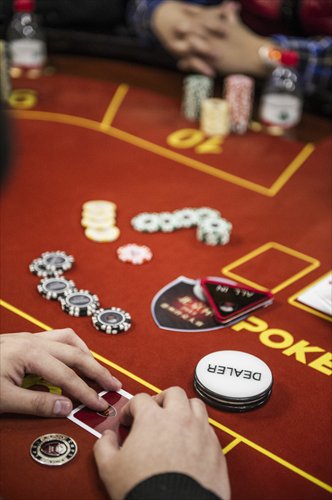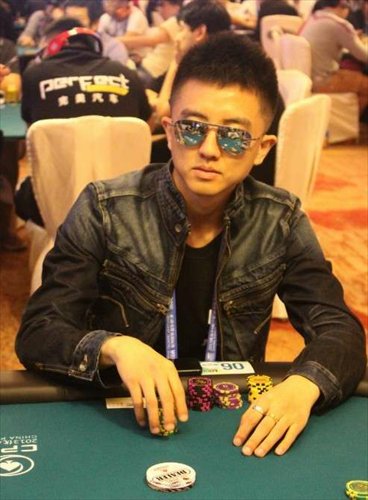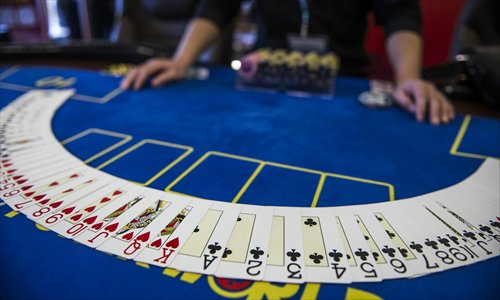HOME >> METRO BEIJING
Beijing puts on its poker face
By Li Ying Source:Global Times Published: 2014-1-6 18:33:01

A player competes in a preliminary round of the China Beijing Poker Tournament held on December 28, 2013. Photo: Li Hao/GT
When Li Sixiao strut into a dimly lit hall hosting last month's China Beijing Poker Tournament, players lifted their eyes off their cards to focus on the 27-year-old beauty. Her curly hair swaying under a gray beret, Li surveyed her competition seated at tables inside Poker World, a Dongcheng district gaming club. Like a boxer making her way to the ring, she walked with a swagger befitting one of China's top Texas Hold 'em stars.
More than 200 poker players from across China and the world participated in the tournament that kicked off on December 28, 2013. Li, better known to the international poker community by her nickname "Juicy," was knocked out of the three-day competition on its opening day.
But she was gracious in defeat, acknowledging her need to improve the mental side of her game.
"I failed to read half of the competitors' faces. It happens. I just have to keep working on my skills at the table," she sighed.
Wang Yehui, one of the referees of the tournament, said the past two years have dealt Chinese first- and second-tier cities a poker boom, with the game "especially popular among the elite."
"Many celebrities, financial brokers and wealthy businessmen are big fans [of poker]," said Wang, who has been involved with the game since 2011.
"One of the most exciting moments is watching a star player beaten by an opponent who has a better hand. Star players don't always win because poker is 75 percent skill and 25 percent luck."
Among China's A-list celebrities, actress Zhang Ziyi and her pop star partner Wang Feng have both tried their hand at Texas Hold 'em in high-profile games.
But for all its fans in China, poker has also attracted its share of critics among authorities wary it is a hub for illegal gambling.

Yang Chongxian Photo: Courtesy of Yang Chongxian

Li Sixiao Photo: Courtesy of Li Sixiao
Doubling down
Li, an actress who graduated from the Central Academy of Drama, was introduced to Texas Hold 'em in 2009 by friends studying in the UK.
Prior to learning poker, her favorite card game was doudizhu, (literally "fight the landlord"). Like poker, the Chinese card game can be learned quickly but take a lifetime to master.
"Poker embodies the spirit of fairness. It is a game that puts players on an equal level, irrespective of social status, wealth, gender and age," Li said.
"Players must rely on persistence, skill, wisdom and luck to win rather than any external forces."
Poker quickly became an obsession for Li, who soon took more interest in the game than in her acting. "I trained to be an actress, but I don't think I am talented at it. I feel more relaxed at the poker table than in front of the camera," she admitted.
Rising up the ranks
To hone her gamesmanship and keep abreast of latest trends on the international poker circuit, Li spent countless hours studying the game by reading books and online forums, and watching televised tournaments.
"My knowledge about acting has enabled me to observe the slightest physical reaction of others," Li said.
Although coy about how much money she has won (or lost) through poker, Li cites two big wins at Macao tournaments for building her confidence. In 2012, she traveled the world to take part in different Texas Hold 'em tournaments.
She won her first Asia Poker Tournament (APT) Title in Cebu, the Philippines, in February 2012. In 2013, she became the first Chinese poker player to be sponsored by UK online gaming company 188BET. Li was ranked the top Chinese player by Global Poker Index at the end of November 2013 based on her record of making seven final tables, three runner-up finishes and win of one championship in the past three years.
"Compared with poker players in the West who are straightforward in their thinking and reasoning, Chinese people are more complicated. I'm sure more Chinese poker stars will emerge in coming years," Li said.

Cards laid out during a game of Texas Hold 'em. Photo: Li Hao/GT
High-stakes profession
Yang Chongxian, 26, has enjoyed a meteoric rise in the poker world since he began playing the game online in 2009 while still a university student. A former businessman who founded a do-it-yourself gift-shop chain, Yang turned professional in 2011.
Yang said he was drawn to poker because it allowed him to socialize and become mentally stronger.
"You have to make key decisions instantly when you're playing. I used to be a blundering, emotional wreck, but now I'm cool and calm under pressure," Yang told Metropolitan.
In 2013, Yang made his name with two important victories. On October 16, he won the World Series of Poker (WSOP) China tournament in Sanya, Hainan Province.
Four days later, he helped guide China's six-man national Texas Hold 'em team to victory over teams from Japan, Singapore and India at the International Federation Poker (IFP) Asian tournament also held in Sanya.
Yang is already preparing for a busy 2014, which will see him compete in the IFP World Cup next month in Brazil and the WSOP that holds its final in June in the world's poker capital, Las Vegas.
"I enjoy a lot of freedom traveling to various tourist resorts around the world to play in poker tournaments," Yang said, adding that the biggest challenge is not being swept up in the rock-star lifestyle of being a professional player.
"There are many professional players, but few are long-term survivors of the poker world," he said.
"Being financially affluent is necessary to become a professional poker player because of the costs of tournament entry fees, travel and accommodation."
Aside from the financial and physical demands of being an elite poker player, there is also the mental strain attached to one of the most psychologically intimidating games.
"A Texas Hold 'em tournament usually lasts four days, over which I'll play at the tables for 10 hours daily with just one hour to rest around noon. This means you have to channel your energy wisely if you are to advance to the final table," Yang said.
Folding under the law
Once strictly played in luxury clubs raided sporadically in anti-gambling crackdowns, poker is gradually winning growing acceptance from mainstream Chinese society.
In December 2012, the Ministry of Public Security wrapped up a nationwide crackdown on gambling that resulted in the closure of more than 30,000 gambling dens, detention of more than 5,700 suspects and seizure of 4.36 billion yuan ($697 million) of illicit funds, the Xinhua News Agency reported.
Tournament organizers tread a fine line in ensuring their events fall into the gaming - and not gambling - category to keep authorities onside. Organizers of the China Beijing Poker Tournament promote the game as a "healthy mental sport" they hope will be spread among the masses.
In 2012, the General Administration of Sport of China approved Hubei Administration of Sport to promote the Texas Hold 'em in Hubei Province. The poker clubs in the area are under the management of the sport governing body.
For his part, Yang, who is currently based in Hubei, is just glad the sport is earning a more acceptable reputation that allows him to take pride in it.
"As a player on the national team, victories at tournaments have allowed my passion for poker to be accepted and recognized by parents and friends," Yang said.
Posted in: Metro Beijing